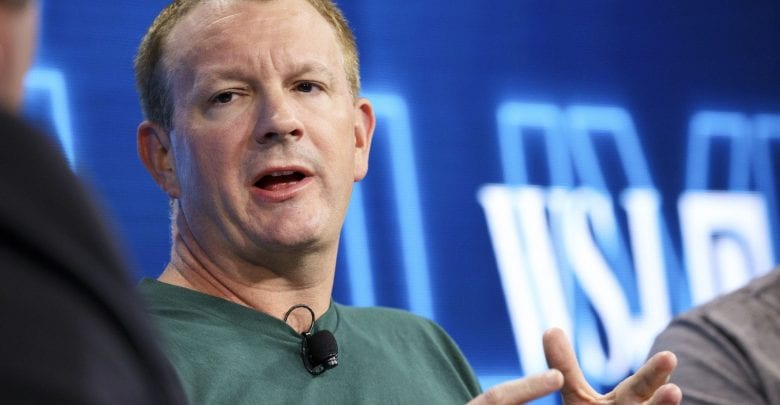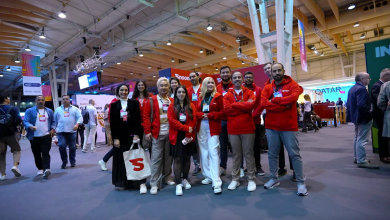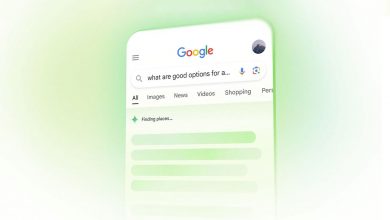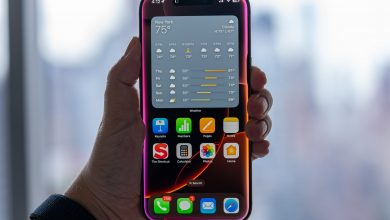
Founder of WhatsApp admits “treason” .. and reveals the cause of disagreement with Facebook
مؤسس واتسآب يعترف بـ “الخيانة”.. ويكشف سبب خلافه مع فيسبوك
WhatsApp Cofounder Brian Acton Gives The Inside Story On #DeleteFacebook And Why He Left $850 Million Behind
WhatsApp cofounder Brian Acton, 46, sits in a cafe of the glitzy Four Seasons Hotel in Palo Alto, California, and the only way you’d guess he might be worth $3.6 billion is the $20 tip he briskly leaves for his coffee. Sturdily built and wearing a baseball cap and T-shirt from a WhatsApp corporate event, he’s determined to avoid the trappings of wealth and runs his own errands, including dropping off his minivan for maintenance earlier that day. An SMS has just come in from his local Honda dealer saying “payment received.” He points to it on his phone.
“This is what I wanted people to do with WhatsApp,” he says of the world’s biggest messaging service, which is used by more than 1.5 billion people and provides ad-free, encrypted messaging as a core feature. “This was informational, and useful.”
The past tense and wistfulness hang in the air. More than four years ago, Acton and his cofounder, Jan Koum, sold WhatsApp, which had relatively insignificant revenue, to Facebook for $22 billion, one of the most stunning acquisitions of the century. Ten months ago he left Facebook, saying he wanted to focus on a nonprofit. Then in March, as details of the Cambridge Analytica scandal oozed out, he sent a Tweet that quickly went viral and shocked his former employers, who had made him a billionaire many times over: “It is time. #deletefacebook.” No explanation followed. He hasn’t sent another Tweet since.
Now he’s talking publicly for the first time. Under pressure from Mark Zuckerberg and Sheryl Sandberg to monetize WhatsApp, he pushed back as Facebook questioned the encryption he’d helped build and laid the groundwork to show targeted ads and facilitate commercial messaging. Acton also walked away from Facebook a year before his final tranche of stock grants vested. “It was like, okay, well, you want to do these things I don’t want to do,” Acton says. “It’s better if I get out of your way. And I did.” It was perhaps the most expensive moral stand in history. Acton took a screenshot of the stock price on his way out the door—the decision cost him $850 million.
He’s following a similar moral code now. He clearly doesn’t relish the spotlight this story will bring and is quick to underscore that Facebook “isn’t the bad guy.” (“I think of them as just very good businesspeople.”) But he paid dearly for the right to speak his mind. “As part of a proposed settlement at the end, [Facebook management] tried to put a nondisclosure agreement in place,” Acton says. “That was part of the reason that I got sort of cold feet in terms of trying to settle with these guys.”
Facebook is probably the most scrutinized company on the planet, while simultaneously controlling its image and internal information with a Kremlin-like ferocity. “Thanks to the team’s relentless focus on building valuable features, WhatsApp is now an important part of over a billion people’s lives, and we’re excited about what the future holds,” says a Facebook spokesperson. That kind of answer masks the kind of issues that just prompted Instagram’s founders to abruptly quit. Kevin Systrom and Mike Krieger reportedly chafed at Facebook and Zuckerberg’s heavy hand. Acton’s account of what happened at WhatsApp—and Facebook’s plans for it—provides a rare founder’s-level window into a company that’s at once the global arbiter of privacy standards and the gatekeeper of facts, while also increasingly straying from its entrepreneurial roots.
It’s also a story any idealistic entrepreneur can identify with: What happens when you build something incredible and then sell it to someone with far different plans for your baby? “At the end of the day, I sold my company,” Acton says. “I sold my users’ privacy to a larger benefit. I made a choice and a compromise. And I live with that every day.”
Despite a transfer of several billion dollars, Acton says he never developed a rapport with Zuckerberg. “I couldn’t tell you much about the guy,” he says. In one of their dozen or so meetings, Zuck told Acton unromantically that WhatsApp, which had a stipulated degree of autonomy within the Facebook universe and continued to operate for a while out of its original offices, was “a product group to him, like Instagram.”
So Acton didn’t know what to expect when Zuck beckoned him to his office last September, around the time Acton told Facebook brass that he planned to leave. Acton and Koum had a clause in their contract that allowed them to get all their stock, which was being doled out over four years, if Facebook began “implementing monetization initiatives” without their consent.
To Acton, invoking this clause seemed simple. The Facebook-WhatsApp pairing had been a head-scratcher from the start. Facebook has one of the world’s biggest advertising networks; Koum and Acton hated ads. Facebook’s added value for advertisers is how much it knows about its users; WhatsApp’s founders were pro-privacy zealots who felt their vaunted encryption had been integral to their nearly unprecedented global growth.
This dissonance frustrated Zuckerberg. Facebook, Acton says, had decided to pursue two ways of making money from WhatsApp. First, by showing targeted ads in WhatsApp’s new Status feature, which Acton felt broke a social compact with its users. “Targeted advertising is what makes me unhappy,” he says. His motto at WhatsApp had been “No ads, no games, no gimmicks”—a direct contrast with a parent company that derived 98% of its revenue from advertising. Another motto had been “Take the time to get it right,” a stark contrast to “Move fast and break things.”
Facebook also wanted to sell businesses tools to chat with WhatsApp users. Once businesses were on board, Facebook hoped to sell them analytics tools, too. The challenge was WhatsApp’s watertight end-to-end encryption, which stopped both WhatsApp and Facebook from reading messages. While Facebook didn’t plan to break the encryption, Acton says, its managers did question and “probe” ways to offer businesses analytical insights on WhatsApp users in an encrypted environment.
Facebook’s plans remain unclear. When Sandberg, Facebook’s COO, was asked by U.S. lawmakers in early September if WhatsApp still used end-to-end encryption, she avoided a straight yes or no, saying, “We are strong believers in encryption.” A WhatsApp spokesperson confirmed that WhatsApp would begin placing ads in its Status feature next year, but added that even as more businesses start chatting to people on the platform, “messages will remain end-to-end encrypted. There are no plans to change that.”
For his part, Acton had proposed monetizing WhatsApp through a metered-user model, charging, say, a tenth of a penny after a certain large number of free messages were used up. “You build it once, it runs everywhere in every country,” Acton says. “You don’t need a sophisticated sales force. It’s a very simple business.”
Acton’s plan was shot down by Sandberg. “Her words were ‘It won’t scale.’ ”
“I called her out one time,” says Acton, who sensed there might be greed at play. “I was like, ‘No, you don’t mean that it won’t scale. You mean it won’t make as much money as . . . ,’ and she kind of hemmed and hawed a little. And we moved on. I think I made my point. . . . They are businesspeople, they are good businesspeople. They just represent a set of business practices, principles and ethics, and policies that I don’t necessarily agree with.”
When Acton reached Zuckerberg’s office, a Facebook lawyer was present. Acton made clear that the disagreement—Facebook wanted to make money through ads, and he wanted to make it from high-volume users—meant he could get his full allocation of stock. Facebook’s legal team disagreed, saying that WhatsApp had only been exploring monetization initiatives, not “implementing” them. Zuckerberg, for his part, had a simple message: “He was like, This is probably the last time you’ll ever talk to me.”
Rather than lawyer up or try to meet in the middle, Acton decided not to fight. “At the end of the day, I sold my company,” he says. “I am a sellout. I acknowledge that.”
Acton’s moral code—or perhaps naivete, given what he should have expected at a $22 billion sale price—traces back to the matriarchs of his family. His grandmother had started a golf club in Michigan; his mother founded a freight-forwarding business in 1985, teaching him to take the responsibilities of a business owner extremely seriously. “She would lose sleep at night [over] making payroll,” Acton told Forbes right before the Facebook sale.
Acton graduated from Stanford with a bachelor’s in computer science and eventually became one of the first employees at Yahoo in 1996, making millions in the process. His biggest asset from that time at Yahoo: befriending Koum, a Ukrainian immigrant he clicked with over their similar no-nonsense style. “We’re both nerdy, geeky guys,” Acton recalled in that earlier interview. “We went skiing together, played Ultimate Frisbee together, played soccer.” Acton left Yahoo in 2007 to travel before returning to Silicon Valley and, ironically, interviewing at Facebook. It didn’t work out, so he joined Koum at his fledgling startup, WhatsApp, persuading a handful of former Yahoo colleagues to fund a seed round while he took on cofounder status and wound up with a roughly 20% stake.
They ran the business in the style that suited them, on a cash basis, with obsessive attention to the integrity of their infrastructure. “A single message is like your first-born child,” Acton would say. “We can never drop a message.”
Mark Zuckerberg first reached out to Koum over email in April 2012, leading to lunch at Esther’s German Bakery in Los Altos. Koum showed the email to Acton, who encouraged him to go. “We weren’t shopping our company,” Acton remembers today. “We had no exit planned.”
But two things sparked Zuckerberg’s mega-offer in early 2014. One was hearing that WhatsApp’s founders had been invited to Google’s Mountain View headquarters for talks, and he did not want to lose them to a competitor. Another was a document analyzing WhatsApp’s valuation, written by Morgan Stanley’s Michael Grimes, that someone had shown to the deal teams at Facebook and at Google.
The biggest internet deal in a decade was rushed through over Valentine’s weekend in the offices of WhatsApp’s lawyers. There was little time to examine details, like the clause about monetization. “It was just me and Jan saying we don’t want to put ads in the product,” Acton says. He recalls Zuckerberg being “supportive” of WhatsApp’s plans to roll out end-to-end encryption, even though it would block attempts to harvest user data. If anything, he was “quick to respond” during the discussions. Zuckerberg “was not immediately evaluating ramifications in the long term.”
Questioning Zuckerberg’s true intentions wasn’t easy when he was offering what became $22 billion. “He came with a large sum of money and made us an offer we couldn’t refuse,” Acton says. The Facebook founder also promised Koum a board seat, showered the founders with admiration and, according to a source who took part in discussions, told them that they would have “zero pressure” on monetization for the next five years.
Facebook, it turned out, wanted to move much faster.
T he warning signs emerged before the deal even closed that November. The deal needed to get past Europe’s famously strict antitrust officials, and Facebook prepared Acton to meet with around a dozen representatives of the European Competition Commission in a teleconference. “I was coached to explain that it would be really difficult to merge or blend data between the two systems,” Acton says. He told the regulators as much, adding that he and Koum had no desire to do so.
Later he learned that elsewhere in Facebook, there were “plans and technologies to blend data.” Specifically, Facebook could use the 128-bit string of numbers assigned to each phone as a kind of bridge between accounts. The other method was phone-number matching, or pinpointing Facebook accounts with phone numbers and matching them to WhatsApp accounts with the same phone number.
Within 18 months, a new WhatsApp terms of service linked the accounts and made Acton look like a liar. “I think everyone was gambling because they thought that the EU might have forgotten because enough time had passed.” No such luck: Facebook wound up paying a $122 million fine for giving “incorrect or misleading information” to the EU—a cost of doing business, as the deal got done and such linking continues today (though not yet in Europe). “The errors we made in our 2014 filings were not intentional,” says a Facebook spokesman.
“It just makes me angry to even relive that,” Acton says.
Linking these overlapping accounts was a crucial first step toward monetizing WhatsApp. The terms-of-service update would lay the groundwork for how WhatsApp could make money. During the discussions over these changes, Facebook sought “broader rights” to WhatsApp user data, Acton says, but WhatsApp’s founders pushed back, reaching a compromise with Facebook management. A clause about no ads would remain, but Facebook would still link the accounts to present friend suggestions on Facebook and offer its advertising partners better targets for ads on Facebook. WhatsApp would be the input, and Facebook the output.
Acton and Koum spent hours helping to rewrite the terms of service and were stymied by a section on messaging from businesses. “We obsessed over these two paragraphs,” Acton remembers. It was here that they lost a battle against the ad model, when a lawyer strongly advised them to include an allowance for “product marketing,” so that if a business did use WhatsApp for a marketing purpose, WhatsApp wouldn’t be held liable.
WhatsApp’s founders then did what they could to postpone Facebook’s monetization plans. During much of 2016, Zuckerberg was obsessed with the competitive threat of Snapchat. This made it easier for WhatsApp to put moneymaking on the back burner and report on new product features that copied Snapchat’s: a new camera that let you add emojis to photos in October 2016, and Status in February 2017, which was widely seen as a clone of Snapchat Stories.
By then, three years since the deal, Zuckerberg was growing impatient, Acton says, and he expressed his frustrations at an all-hands meeting for WhatsApp staffers. “The CFO projections, the ten-year outlook—they wanted and needed the WhatsApp revenues to continue to show the growth to Wall Street,” Acton recalls. Internally, Facebook had targeted a $10 billion revenue run rate within five years of monetization, but such numbers sounded too high to Acton—and reliant on advertising.
Acton had an alternative that he tried pushing back with: Invite businesses to send “informational, useful content” to WhatsApp users, like the SMS from his Honda dealer, but don’t allow them to advertise or track data beyond a phone number. He also pushed the metered-user model. Both to no avail.
Acton had left a management position on Yahoo’s ad division over a decade earlier with frustrations at the Web portal’s so-called “Nascar approach” of putting ad banners all over a Web page. The drive for revenue at the expense of a good product experience “gave me a bad taste in my mouth,” Acton remembers. He was now seeing history repeat. “This is what I hated about Facebook and what I also hated about Yahoo,” Acton says. “If it made us a buck, we’d do it.” In other words, it was time to go.
Meanwhile, Koum stayed. He would accrue time toward his final stock grants, even if he rarely went to the office (“rest and vest,” in Silicon Valley parlance). Koum was “able to get through it,” finally leaving this April, the month after Acton’s #deletefacebook tweet, announcing via a Facebook post that he would focus on collecting air-cooled Porsches. In August 2018, when Forbes sat down with Acton, another source said Koum was sailing on a yacht in the Mediterranean, far away from everything. He could not be reached for comment.
If walking away from $850 million feels like penance, Acton has gone further. He has supercharged a small messaging app, Signal, run by a security researcher named Moxie Marlinspike with a mission to put users before profit, giving it $50 million and turning it into a foundation. Now he’s working with the same people who built the opensource encryption protocol that is part of Signal and protects WhatsApp’s 1.5 billion users and that also sits as an option on Facebook Messenger, Microsoft’s Skype and Google’s Allo messenger. Essentially, he’s re-creating WhatsApp in the pure, idealized form it started: free messages and calls, with end-to-end encryption and no obligations to ad platforms.
Acton says that Signal now has unspecified “millions” of users, with a goal to make “private communication accessible and ubiquitous.” While Acton’s $50 million should take it a long way—Signal could afford only five full-time engineers until he came along—the foundation wants to figure out a perpetual business model, whether that means taking corporate donations like Wikipedia or partnering with a larger company, as Firefox has done with Google.
Others have come into the space as well. AnchorFree, a software company in Redwood City, California, makes a virtual private network that hides your online activity and has been downloaded 650 million times. The company has raised $358 million and is reportedly profitable. The private search engine DuckDuckGo is grossing $25 million a year, showing ads but without using your search history to build a secret profile like Google does. Regulators in many countries are similarly pushing back on ad tracking. Saul Klein, one of London’s leading venture capitalists, predicts that Facebook will eventually be forced to offer an ad-free subscription option. Acton’s metered model, in other words, might get the last laugh.
Acton, for his part, is trying to look forward. Besides Signal, he’s put $1 billion of the Facebook proceeds into his philanthropic arms, to support healthcare in impoverished areas of the U.S. as well as early childhood development. He also says he’s determined to raise his kids normally, from public schools to that Honda minivan to a (relatively) modest house. Acton notes, however, that it’s just one mile away from Zuckerberg’s compound. Extreme wealth, it seems, is “not as liberating as you would hope.”
source: forbes.com
كشف براين أكتون الشريك المؤسس لتطبيق “واتسآب” أن سياسة الخصوصية ووظيفة التطبيق المشفرة، كانت من بين أسباب اشتعال الخلاف بينه وبين الرئيس التنفيذي لشركة فيسبوك مارك زوكوبيرغ.
وقال أكتون لمجلة “فوربس” الأمريكية أن بيع زوكوبيرغ لبيانات المستخدمين دفعه للاستقالة العام الماضي وترك 850 مليون دولار، عبارة عن نصيبه من أرباح الشركة، التي ارتفعت أسهمها قُبيل مغادرة مكتبه”.
وأوضح أن عدم تأجيل استقالته للحصول على حصته من أرباح بيع أسهم الشركة بالقول “لم أستطع الانتظار (..)، كل ما رغبت فيه هو المغادرة فورا”.
وأشار إلى أنه “حاول إقناع مارك زوكوبيرغ بالتراجع عن بيع بيانات المستخدمين، واقترح بدائل لتحقيق الدخل من التطبيق، عبر فرض رسوم بعد استخدام عدد كبير من الرسائل المجانية”، موضحا أن “كبيرة مسؤولي التشغيل في فيسبوك شيريل ساندبرغ رفضت اقتراحه، وأكدت أن ذلك لن يمكن الشركة من رفع دخلها”.
ولفت أكتون إلى أن “رد زوكوبيرغ على سؤاله حول إصرار فيسبوك على إعلانات واتس آب، كان بالقول إنه ربما ستكون هذه آخر مرة تتحدث فيها إلي”، مشيرا إلى أن “شركة فيسبوك بعد استحواذها على واتس آب بنحو 14 مليار دولار، أرادت عرض إعلانات في حالات مستخدمي التطبيق، ويتم تحديدها اعتمادا على بيانات وخصوصية المستخدمين، بالإضافة إلى تمكين الشركات المعلنة من التواصل مباشرة مع مستخدمي التطبيق عبر الرسائل الخاصة”.
واعتبر أن “فيسبوك لن تتخلى عن خططها لتحقيق أرباح عبر استثمار واتس آب بأي طريقة كانت”، رافضا في الوقت ذاته تحميل الشركة المسؤولية الأخلاقية لبيع بيانات وخصوصية مستخدمي “واتس آب”.
واعترف أكتون بتحمله الشخصي للمسؤولية قائلا إنني “بعت خصوصية المستخدمين لشركة فيسبوك ليحققوا أرباحا أكبر (..)، أنا خائن وأعترف بذلك”، مؤكدا أن “العاملين في فيسبوك رجال أعمال جيدون، يسعون لتحقيق أرباح بمختلف الوسائل، وشعارهم: إذا كان الأمر يحقق أرباحا فسنقوم به”.



